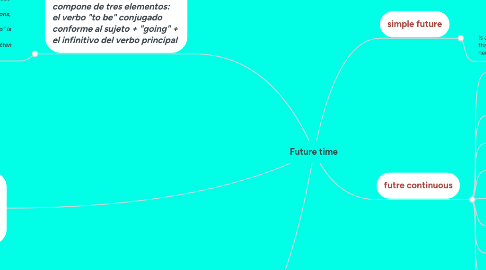
1. h
2. perfet future
2.1. The "future perfect" is composed of two elements: the "simple future" of the verb "to have" (will have) + the "past participle" of the main verb
2.1.1. FUNCTIONS The "future perfect" refers to an action that will be completed in the future. When we use this verbal tense, we are projecting ourselves into the future and looking back at an action that is concluded sometime after the present. Most of the time, it is used with temporary expressions.
2.1.1.1. EXAMPLES I will have been here for six months on June 23rd. By the time you read this I will have left. You will have finished your report by this time next week. Will not they have arrived by 5:00? Will you have eaten when I pick you up?
3. Cuando empleamos "going to" en una oración para referirnos al futuro, la construcción se compone de tres elementos: el verbo "to be" conjugado conforme al sujeto + "going" + el infinitivo del verbo principal
3.1. FUNCTION The use of "going to" to refer to future events suggests a very solid link with the present. The precise moment is not relevant, it is later than now, but the attitude implies that this event depends on something we know about the current situation. "Going to" is used mostly to talk about our plans and intentions, or to make predictions based on current evidence. In everyday discourse, "going to" is often shortened as "gonna", especially in American English, although it is never written like that.
3.1.1. USO DE "GOING TO" PARA REFERIRSE A PLANES E INTENCIONES
3.1.2. EJEMPLOS
3.1.3. Is Freddy going to buy a new car soon?
3.1.4. Are John and Pam going to visit Milan when they are in Italy?
3.1.5. I think Nigel and Mary are going to have a party next week.
3.1.6. We are going to have dinner together tomorrow.
3.1.7. Aren't you going to stay at the library until your report is finished?
3.1.8. USO DE "GOING TO" PARA FORMULAR PREDICCIONES
3.1.9. EJEMPLOS
3.1.10. He's going to be a brilliant politician.
3.1.11. I'm going to have a hard time falling asleep.
3.1.12. You're going to be sorry you said that.
3.1.13. Is it going to rain this afternoon?
3.1.14. Aren't they going to come to the party?

